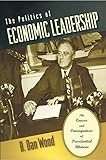The Politics of Economic Leadership : The Causes and Consequences of Presidential Rhetoric / B. Dan Wood.
Material type: TextPublisher: Princeton, NJ : Princeton University Press, [2022]Copyright date: ©2008Description: 1 online resource (221 p.) : 37 line illus. 10 tablesContent type:
TextPublisher: Princeton, NJ : Princeton University Press, [2022]Copyright date: ©2008Description: 1 online resource (221 p.) : 37 line illus. 10 tablesContent type: - 9780691225623
- POLITICAL SCIENCE / American Government / Executive Branch
- Annual Economic Report of the President
- Barrett, Andrew
- Blumenthal, Sidney
- Brace, Paul
- Bureau of Economic Analysis
- Bureau of the Budget
- Canes-Wrone, Brandice
- Chappell, Henry W
- Clark, Harold D
- Council of Economic Advisors
- Druckman, James N
- Economic Report to Congress
- Erickson, Robert S
- Federal Reserve Board
- GDP (Gross Domestic Product)
- Gergen, David
- Great Depression
- Greenstein, Fred
- Gross Domestic Product (GDP)
- Heclo, Hugh
- Hinckley, Barbara
- Iran hostage crisis
- Jacobs, Lawrence R
- Keech, William P
- Kernell, Samuel J
- Keynesian economics
- Machiavelli, Niccolo
- Mueller, John
- National Economie Council
- Norpoth, Helmut
- Omnibus Budget Reconciliation Act
- Page, Benjamin I
- Peake, Jeffrey
- Ragsdale, Lyn
- Roosevelt, Theodore
- Stimson, James A
- Treasury Department
- WCALC
- Welch, Reed
- Wilson, Woodrow
- economic growth
- elections
- energy crisis
- executive orders
- inertia
- institutional prerogatives
- intensity of economic rhetoric
- misery index
- reverse causality as factor
- scandals
- stagflation
- systematic relationships
- online - DeGruyter
| Item type | Current library | Call number | URL | Status | Notes | Barcode | |
|---|---|---|---|---|---|---|---|
 eBook
eBook
|
Biblioteca "Angelicum" Pont. Univ. S.Tommaso d'Aquino Nuvola online | online - DeGruyter (Browse shelf(Opens below)) | Online access | Not for loan (Accesso limitato) | Accesso per gli utenti autorizzati / Access for authorized users | (dgr)9780691225623 |
Browsing Biblioteca "Angelicum" Pont. Univ. S.Tommaso d'Aquino shelves, Shelving location: Nuvola online Close shelf browser (Hides shelf browser)

|

|

|

|

|

|

|
||
| online - DeGruyter The Renewal of the Priesthood : Modernity and Traditionalism in a South Indian Temple / | online - DeGruyter The Underwater Eye : How the Movie Camera Opened the Depths and Unleashed New Realms of Fantasy / | online - DeGruyter Black Pride and Black Prejudice / | online - DeGruyter The Politics of Economic Leadership : The Causes and Consequences of Presidential Rhetoric / | online - DeGruyter Services and Employment : Explaining the U.S.-European Gap / | online - DeGruyter Chinese Primer : Character Workbook (GR) / | online - DeGruyter On Not Being Able to Sleep : Psychoanalysis and the Modern World / |
Frontmatter -- Contents -- Illustrations -- Tables -- Preface -- CHAPTER 1 Presidential Words and the Economy -- CHAPTER 2 Measuring the Intensity and Tone of Presidential Rhetoric about the Economy -- CHAPTER 3 What Determines the Intensity and Tone of Presidential Rhetoric on the Economy? -- CHAPTER 4 Four Cases of a President's Rhetorical Leadership of the Economy -- CHAPTER 5 Do Presidents Affect Public Approval of Their Job Performance through Economic Rhetoric? -- CHAPTER 6 Does Presidential Rhetoric on the Economy Affect Economic Behavior and Performance? -- CHAPTER 7 Why Should We Care about Presidents' Economic Rhetoric? -- Notes -- References -- Index
restricted access online access with authorization star
http://purl.org/coar/access_right/c_16ec
The American president is widely viewed by the public and media as the nation's single most influential political and economic figure. But social scientists have often concluded that presidential words fall "on deaf ears" or have little lasting impact on policy or public opinion. Then why did Bill Clinton make 12,798 public references to the economy during his eight years in office compared with Harry Truman's mere 2,124 during his own two terms? Why George W. Bush's 3,351 remarks during his first term? Did all these words matter? The Politics of Economic Leadership is the first comprehensive effort to examine when, why, and how presidents talk about the economy, as well as whether the president's economic rhetoric matters. It demonstrates conclusively that such presidential words do matter. Using an unprecedented compendium of every known unique statement by U.S. presidents about the economy from World War II through the first George W. Bush administration, Dan Wood measures the relative intensity and optimism of presidents' economic rhetoric. His pathbreaking statistical analysis shows that presidential words can affect everything from approval of the president's job performance to perceptions of economic news, consumer confidence, consumer behavior, business investment, and interest rates. The impacts are both immediate and gradual. Ultimately, Wood concludes, rhetoric is indeed a tool of presidential leadership that can be used unilaterally to affect a range of political and economic outcomes.
Mode of access: Internet via World Wide Web.
In English.
Description based on online resource; title from PDF title page (publisher's Web site, viewed 29. Jun 2022)


